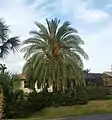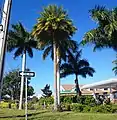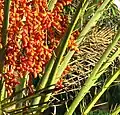| Phoenix sylvestris | |
|---|---|
_tree_at_Purbasthali_W_IMG_1494.jpg.webp) | |
| In West Bengal, India | |
| Scientific classification | |
| Kingdom: | Plantae |
| Clade: | Tracheophytes |
| Clade: | Angiosperms |
| Clade: | Monocots |
| Clade: | Commelinids |
| Order: | Arecales |
| Family: | Arecaceae |
| Genus: | Phoenix |
| Species: | P. sylvestris |
| Binomial name | |
| Phoenix sylvestris | |
| Synonyms[1] | |
| |
Phoenix sylvestris (sylvestris - Latin, of the forest) also known as silver date palm, Indian date, sugar date palm or wild date palm,[2] is a species of flowering plant in the palm family native to southern Pakistan, most of India, Sri Lanka, Nepal, Bhutan, Myanmar and Bangladesh. It is also reportedly naturalized in Mauritius, the Chagos Archipelago, Puerto Rico and the Leeward Islands.[1] Growing in plains and scrubland up to 1300 m above sea level, the fruit from this palm species is used to make wine and jelly. The sap is tapped and drunk fresh or fermented into toddy. The fresh sap is boiled to make palm jaggery in West Bengal state of India and Bangladesh.

Description
Phoenix sylvestris ranges from 4 to 15 m in height and 40 cm in diameter; not as large as the Canary Island Date Palm, but nearly so, and resembling it. The leaves are 3 m long, gently recurved, on 1 m petioles with acanthophylls near the base. The leaf crown grows to 10 m wide and 7.5 to 10 m tall containing up to 100 leaves. The inflorescence grows to 1 metre with white, unisexual flowers forming to a large, pendent infructescence. The single-seeded fruit ripens to a purple-red colour.[3]
Gallery
 Growing in Englewood Florida
Growing in Englewood Florida_female_flowers_at_Narendrapur_W_IMG_4056.jpg.webp)
_male_flowers_at_Narendrapur_W_IMG_4059.jpg.webp)
 Mature specimens, Ft Myers, Florida
Mature specimens, Ft Myers, Florida Fruits and spines in the Yucatán, Mexico
Fruits and spines in the Yucatán, Mexico Growing on Saint Simons Island in Georgia USA
Growing on Saint Simons Island in Georgia USA-_lower_trunk_at_Purbasthali_W_IMG_1660.jpg.webp)
 Fruits in Karnataka, India
Fruits in Karnataka, India Palm sugar from Kerala (India) – traditional cottage industry
Palm sugar from Kerala (India) – traditional cottage industry.jpg.webp) Fruits in Sri Lanka
Fruits in Sri Lanka
References
- 1 2 3 "Phoenix sylvestris". World Checklist of Selected Plant Families (WCSP). Royal Botanic Gardens, Kew. Retrieved 10 January 2017.
- ↑ "Phoenix sylvestris". Germplasm Resources Information Network. Agricultural Research Service, United States Department of Agriculture. Retrieved 10 January 2017.
- ↑ Riffle, Robert L. and Craft, Paul (2003) An Encyclopedia of Cultivated Palms. Portland: Timber Press. (Pages 405-406) ISBN 0-88192-558-6 / ISBN 978-0-88192-558-6